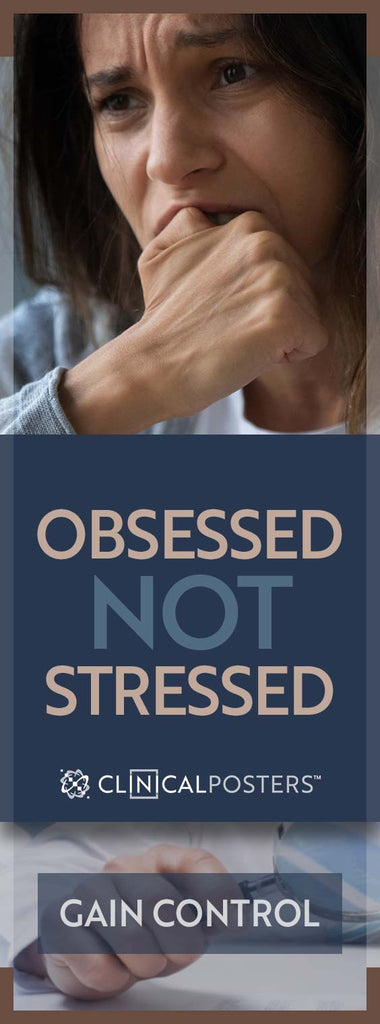Learn to prioritize. With cognitive behavioral therapy, this is possible for those with OCPD and to a lesser degree for someone with OCD.
Ignore Me While I Do This
May is Mental Health Awareness Month.
Are you a compulsive shopper? Obsessive Compulsive Disorder (OCD) is an irrational obsession with uncontrollable behaviors. Imagine how happy merchants are with OCD shoppers—until the customers return everything and order again. According to the National Institute of Mental Health, a person with OCD generally:
- Can not control his or her thoughts or behaviors, even when those thoughts or behaviors are recognized as excessive.
- Spends at least 1 hour a day on these thoughts or behaviors.
- Does not get pleasure when performing the behaviors or rituals, but may feel brief relief from the anxiety the thoughts cause.
- Experiences significant problems in their daily life due to these thoughts or behaviors.
Watch Me Do This Better Than Anyone
The word compulsive can carry a stigma. People associate it with phrases beginning with “serial” like serial killer or serial entrepreneur. Perhaps when you are in control, things appear great. But what about when your success is dependent upon the actions of others? Or what happens when you are not able to complete the projects you set out to accomplish? Do you spiral into anxiety, withdrawal, or depression?
Obsessive Compulsive Personality Disorder (OCPD) is a disposition that propels you to strive for perfection. When obsessions are inwardly focused, you may endeavor personal excellence and feel shattered or depressed when criticized. Outwardly focused perfectionism spills into the lives of others who become the focus of nitpicking. OCPD is diagnosed when symptoms impair your ability to function and interact with others:
- Excessive devotion to work at the expense of family or social relationships
- Extreme attention to detail
- Fixation with lists
- Hoarding worn or useless items
- Inability to share or delegate work because of a fear it won’t be done right
- Overwhelming need for order
- Perfectionism to the point that it impairs the ability to finish tasks
- Rigid adherence to moral and ethical codes
- Sense of righteousness about the way things should be done
- Stiff, formal, or rigid mannerisms
Someone with OCPD is generally considered a perfectionist. You may have many compulsions or they can be grouped under a predominant theme. It can be creative, like writing, cooking, or drawing. Compulsions over appearance might drive you to fill closets with hundreds of outfits. Unhealthy obsessions include excessive eating, biting nails, pulling hair, cutting, gaming, gambling, and other addictions.

Obsessive thinking is a series of recurring thoughts (rumination), often paired with negative and distressing judgments. They can include unflattering self-judgements such as “I’m not good enough,” or spiral into fears of imminent death.
If you do not limit obsessions, you seem to excel in every endeavor—even though others may worry about you. Imagine planning an event for 300 people. Not only do you want to prepare a three-course meal yourself, you are the one most qualified to decorate the venue, provide the entertainment, and do the calligraphy for the seating assignments.
Even with the most organized schedules and shopping lists, time can get away from you. As the guests pour in, dinner plans are likely to be less than perfect.
The event planning is indicative of someone with obsessions, but actions are not limited to grandiose occasions. If you are obsessed with hygiene, you may avoid using public restrooms. True, most of them are unclean. Seat liners are inadequate protection. At home, you have more control of the environment and can shower or change clothes after toilet visits. Maybe you are the “grammar police” of online forums.
Too Many Drivers
Dealing with multiple obsessions is like driving a car full of backseat drivers. They just all happen to be you. Several voices are shouting about where to turn and how to succeed.
To get everything done, you pour yourself into projects to the extent of sacrificing sleep and health. Perfectionism comes with a price. Extreme self-absorption can lead to depression, anxiety, and burnout.
There is no shortage of things to obsess over: Recording calories; maintaining your BMI; counting your steps; and building body mass. These externally imposed obsessions compete with family obligations like secular work or caring for your family.
When weight becomes an obsession it can cause extreme dieting and exercising. Extreme diets eliminate all protein, carbohydrates, or fat. Compulsive exercise can consume hours every day. With these distractions from daily life, someone with OCPD can lose track of other priorities.
Take the Off Ramp
A helpful way some handle OCPD compulsions is to choose projects wisely. You may still pine away for long hours—even weeks or months—but obsessing over one project is better than 10. Choose one path for now, activate your turn signal, and exit at the next off-ramp. In practical terms, select obsessions wisely. Learn to say, “No.” Exert energy on what matters most. Decline involvement in secondary activities with which you are likely to unduly obsess.
What if you feel you cannot dial back obsessions on your own? With cognitive behavioral therapy and visualization techniques, it is possible for those with OCPD—to a lesser degree for someone with OCD—to adjust their behavior. Addictions often require additional therapies. Seek a support group or talk to your physician.
To support the writing of useful articles about mental health, ClinicalPosters sells human anatomy charts, scientific posters, and other products online. You may sponsor specific articles, become a ClinicalNovellas Member, or remit a small donation.
ClinicalPosters sells human anatomy charts, scientific posters, and other products online to offset expense of the writing useful articles about mental health. Slide extra posters into DeuPair Frames without removing from the wall.
Show your support by donating, shopping for ClinicalPins, becoming a ClinicalNovellas Member, or leaving an encouraging comment to keep the research going.
To support the writing of useful articles about mental health, ClinicalPosters sells human anatomy charts, scientific posters, and other products online. You may sponsor specific articles or remit a small donation.
ClinicalPosters sells human anatomy charts, scientific posters, and other products online to offset expense of the writing useful articles about mental health. Slide extra posters into DeuPair Frames without removing from the wall.
ClinicalPosters sells human anatomy charts, scientific posters, and other products online. You may remit a small donation or become a ClinicalNovellas Member.
You can support the writing of useful articles about mental health by sponsoring specific articles, becoming a ClinicalNovellas Member, or remitting a small donation. Visible content is optimized for device size.








 Romance & Health Intertwine. Fall in love with a captivating romance miniseries that explores the essence of well-being. Become a ClinicalNovellas member for heartwarming tales.
Romance & Health Intertwine. Fall in love with a captivating romance miniseries that explores the essence of well-being. Become a ClinicalNovellas member for heartwarming tales.







